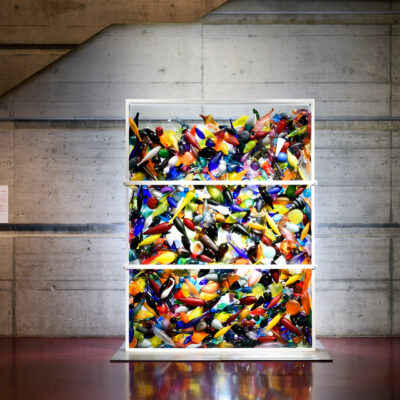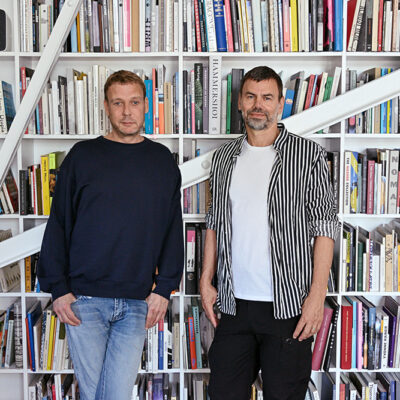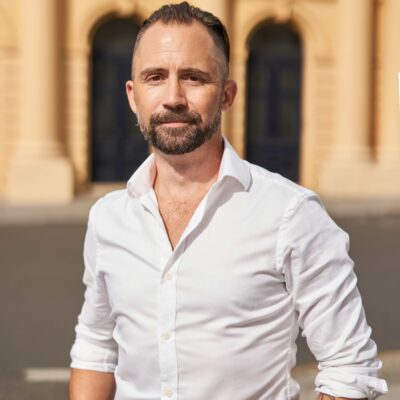Kristen Knupp: I understand that there is a new program at Geneva Business School that focuses on the art world, and I wanted to hear more about the new program, how it started, and how you are involved with it.
Sixtine Crutchfield: I am an alumni of Geneva Business School. When I came back from Australia in 1997, I found a job at a bank called Edouard Constant which was eventually taken over by EFG Private Bank. I had been working in the art world up until then, and the bank offered to pay for my MBA at Geneva Business School. It was a course on asset management so I became an asset manager and I had my own desk and area within the bank. We started an extra service for high-net-worth individuals on art banking. In 1999, art banking was not what we know today, it was just an advisory service and my territory was Scandinavia. I visited the clients in their homes, and I had about 300 clients who I had to try to retain. When I went to their homes to discuss their accounts, I got to see all their art collections and we became friends while discussing art. Out of the 300 clients, I retained every single one.
So when I came back I said to the bank that we need to have an art advisory desk, and it was a value-added service for the bank. After EFG took over, they were not interested in this area so I left and went back into the art world, and went to Russia to exhibit among other things, and met many interesting art world personalities over the years.
All the while, I stayed friends with the owner of Geneva Business School, Mr Francis Kahn. Fifteen years ago he asked me to look after the 10th anniversary celebration. All of the alumni were basically bankers in Geneva, so that was fun and a nice mandate. Then, in September 2019, he asked me to do the same thing for the 25th anniversary. But in the meantime, he had grown the school tremendously, so now it has 66 different nationalities, and they offer Bachelor’s degrees alongside the Master’s degree. Along with asset management, they now also do oil and gas, sports management, and always focused on the business side of things.
I had gathered a list of 600-800 alumni for the 25th anniversary, and when the pandemic hit and our plans had to change, I suggested that we do something different and launch a new program. The art market has been buoyant for a long time and so for the 25th anniversary we decided to launch a new art business program. This was in early 2020, then we locked down, and went online and invested in all the technology to allow us to continue to teach the students. So now we have a super system for online teaching. Each classroom has three cameras, the teacher can share the screen, we have breakout rooms, etc. In April we reopened, so we are hybrid now.

KK: So the new program is called an Art MBA?
SC: It is an MBA and we called it FAIM, Fine Art International Management. We have used the existing MBA, so there are accounting, import/export, management, and entrepreneurship classes with the rest of the school, and then we have seven compulsory components that are to do with art. I have asked people who are known and excellent in their field to come and teach each of these classes.
For Art Law, I asked Sandrine Giroud from the LALIVE Firm to teach it, they founded the Art Law Foundation in Geneva. They will teach about restitution, orphan artworks, loss and theft, compliance, money laundering, freeports, duplication, authentication, digital works, multiples, NFTs, blockchain. etc. A lawyer specialised in each of these topics will teach that topic, so we will have practicing experts teaching.
The second component is Art as a Financial Asset. We have Adriano Picinati di Torcello from Deloitte in Luxembourg, and he will teach online and come once or twice during the semester. He will talk about the art market, the report he publishes every week, indices like Sotheby’s Mei Moses Index, and what works and what doesn’t. I have also asked Aude Lemogne with Group Reyl because she started a unique system for people to borrow in art, together with Reyl. They will probably send us some of their asset managers to attend the course.
We also have Nelly Wenger teaching Project Management who was a director at Nestle and is involved with The Greater Paris Project, which is the metro line that will link up all the big museums in Paris. Then, we have Marc Restellini who will talk about museum science, forensics, evaluating artworks, how to exhibit, light, archive, write catalogs, etc. Sarah Kenerdine from EPFL has promised to invite us to her labs and share new technologies in museology, virtual reality, and innovative ways of exhibiting that are interactive. We will also have guest speakers such as Simon Hewitt talking about media for museums.
Next, we have Entrepreneurship with Charly Bailly, who is a third generation gallerist, and he will talk about what a gallery does to be successful, taking works on consignment or not, emerging artists, doing art fairs or not, NFTs, etc. Basically, the business of running an art gallery.
Then we have Logistics with Virginie Roure from Rodolphe Haller, and she will talk about customs, freeport, storage: how it works, handling, packing, and accreditation.
Last but not least, there is History of Art, and I have Frédéric Elkaïm, who has his own school called Art Now!, and worked for the Drouot Formation and the French Ministry of Culture collections, in Paris. He will teach the history of art relative to the art market, so retaining the business element. He will cover Ancient Art to Impressionism in the first introductory class, and then focus on the more modern period from Impressionism to Contemporary and Emerging Art to tie it into the art market.

KK: How long did it take to organise this program?
SC: I like to say 35 years because it is a culmination of everything I know, but actually one year. Initially, I prepared the program and talked to all the potential professors, and then I spoke to the Dean of Academics, to be sure the MBA will be recognised. The Dean of Academics helped me create the curriculum, because there are learning goals and assessments, as well as a final project for the students, which can be a thesis, management report, or a project. So it took a year, and I got the green light three weeks ago.
KK: You only received the green light three weeks ago?
SC: Yes, so I am doing a lot of publicity to get the program known, I am doing a lot of podcasts, talks on the internet, webinars, I’ve joined Clubhouse where I plan to make some talks, and we have some new short film capsules that will go out soon, and a brochure. Soon I will be knocking on doors to get it known.
We want to remain small, and we will have two intakes per year, with 25 students maximum each time. We prefer that the students come here in person and they will all be post graduates, as it is a masters program. Ideally, they will have worked already and can continue working as we will offer only evening classes. Some people asked if we would take retired people and we will, but it will be selective. So we are hoping for 50 people to be accepted to the program in September, and then 25 people will start in September, and then the next 25 will be in February.
There is room for expansion, if we have 100 people applying in September, then we will think about expanding. We also have a campus in Barcelona, and at the moment, the program is based in Geneva, but we can see if we will expand to other campuses in the future. Geneva is the home base.
The courses are 5:00 until 8:00 in the evening, but those who are here will be able to go on day trips, if the pandemic allows. We will go to the museums, Art Basel, Fondation Beyeler, and any exhibition in Lausanne or Geneva. My added value is that I know everyone, so they will meet the owner of the gallery, or the artist themselves. There will also be lunchtime conferences. I have been doing this for fifteen years with the International Circle of the Geneva Foundation, so the students will benefit from all of my connections in the art world.
KK: Who are the competitors with the program?
SC: There are competitors but none are quite as comprehensive. The closest one is at University of Zurich, but it specialises in the business side, e.g. entrepreneurship, and the law. So they don’t do logistics, museum studies, or history of art in as much depth. Then there are the Sotheby’s capsules, but they are a series of certificates whereas we offer our graduates an MBA. So none have an MBA that is focused on art. My aim is that I want to share the knowledge that we have in Geneva so that others can benefit from the richness and opportunities in the art world.
KK: Is it taught in English?
SC: Yes, it is all in English. The professors are from all over the world. For example, we will have a speaker from New York University who is also an Art Historian at the Museum of Modern Art. So there are very high-level people who will be sharing their experience with our students.
KK: Any big surprises, pleasant or otherwise?
SC: I think the speed at which we have been able to organise the program has been impressive. I was able to make my own luck, and I believe in this school. What I am adding to the curriculum has been very well-received, and I have had so much support. Only two professors have said no, due to lack of time, and everyone else was interested in participating.
KK: Your network is amazing, and you are in a unique position, so it is no wonder that you have had a good reaction to this idea.
SC: Having the quality of Geneva Business School combined with my experience in the art world has been a good combination. The pandemic helped in a way, because we were well-positioned to go online. And the art market has continued to work and kept going, so there is ongoing interest in this area.

KK: I studied at the Christie’s program in London and the professors who taught us were so well-connected in the art world. It was a great way to find a job in a new profession.
SC: That is another benefit and some of the professors have said that they will offer places to the top students who show promise in their classes. They are all doing projects and they will be using us as a pool for future assistants or project managers.
KK: Could I ask much does it costs?
SC: It is 14,000 CHF per semester, so times that by three, and as of next year it will be 18,000 CHF. I compared it with Christies and Sotheby’s and we are in line with their pricing even if we offer a fully-fledged MBA diploma. Geneva Business School is ranked in the top 60 business schools in the world by CEO Magazine and 2nd in Switzerland for value for money. It is an 18-month program, one year of classes, and then in the last six months you have a supervisor and work on a project, business plan, or thesis. For example, one could look at a gallery opening in a new location and create the business model for that proposition. The program is set up so that people can work and do the program at the same time, since the classes are in the evening. However, if someone comes from overseas just for this program, they are helped with finding accommodation by the existing school services.
KK: Who is the program targeting as students?
SC: I would really like people from Geneva coming on board, such as the bankers and advisors from family offices. I think all their high-net-worth clients, who are all art collectors, would like advisors with a specialised Art MBA. I think the timing is perfect for this. Also the insurance industry, lawyers, and those who want to work in museums, or in cultural event management. I think those who will benefit the most are bankers who have a different mindset and need the added value of knowing about art, it will most certainly give them the extra edge on their competition. Many of the international banks already have art advisory services. When I worked in banking, I had a 100% success rate in retaining the clients and convincing them to expand their portfolios thanks, at least partially, to my interest in my client’s art collections. Art provides a personal connection to the clients and this will bring more business to the banks. In my opinion, this should be a core part of the Swiss know-how.
To find out more visit the Geneva Business School website.




